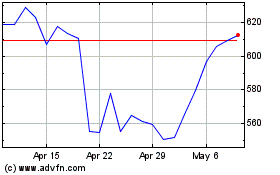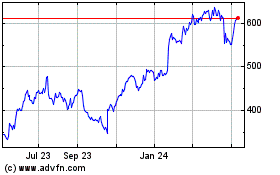By Ben Fritz
A federal judge's verdict this coming week on whether AT&T
Inc. can acquire Time Warner Inc. will shape a much broader drama:
a radical reordering of the entertainment business that's reaching
every corner of Hollywood.
Technology giants are rapidly devouring a media industry that
has long been dominated by the same group of entertainment
companies -- storied Hollywood studios, television networks and
cable giants. Now, many of those incumbents are scrambling to
transform themselves so that they can stand up to the powerful
invaders from Northern California.
"I've never seen this much uncertainty and insecurity in the
legacy entertainment businesses before," said Bruce Berman, a
veteran studio executive who heads Village Roadshow Pictures.
Netflix Inc. is leading the charge. The company has 131 million
subscribers world-wide, drawn to its massive array of programming
available to watch anytime and anywhere. But the true threat it
poses to traditional media firms is behind the scenes. It is this
year streaming about 700 pieces of original content -- television
series, movies, stand-up specials and more -- to consumers with
whom it has direct relationships, making it a new type of media
superpower possible only in the digital age.
Its success, along with similar looming threats from tech giants
like Amazon.com Inc. and Apple Inc., are leading other major media
players to press for the scale and breadth necessary to remain
relevant.
If AT&T's purchase of Time Warner goes ahead as planned, it
would combine a wireless-data giant with the parent of
premium-cable powerhouse HBO, film and television studio Warner
Bros. and cable networks like TNT and CNN.
Next in line is Walt Disney Co.'s $53 billion agreement to buy
most of the assets of 21st Century Fox Inc., intended to create an
entertainment behemoth big enough to launch new digital businesses
that could compete with Netflix -- unless Comcast Corp. snags the
deal with its own competing offer for the assets. (21st Century Fox
and Wall Street Journal-parent News Corp share common
ownership.)
CBS Corp and Viacom Inc. have held on-and-off talks about
combining, complicated by clashes between CBS's management and the
two companies' common owner.
Practically every other major Hollywood company has spent the
past year more quietly considering potential purchases, sales or
mergers, according to people close to them.
Sony Pictures Entertainment is often named as a potential
acquisition target, but the Japanese-owned studio isn't currently
for sale, its top executives have said. That's in part because its
management is attempting to improve its previously weak performance
and increase its value to be in a stronger position as a buyer or
seller, a person close to the studio added. Sony has considered
going after Metro-Goldwyn-Mayer Inc., an independent studio that
bought the pay-cable channel Epix last year, the person said.
MGM has also long been a target of Lions Gate Entertainment
Corp. Lions Gate, meanwhile, in 2016 acquired pay cable channel
Starz and recently bought majority control of a large talent
management and TV production company, 3 Arts Entertainment.
In some cases, media companies are also seeking more global
exposure in these deals -- something Netflix already has in
virtually every country except China. And then there's the pressure
to compete against digital powerhouses Facebook Inc. and Alphabet
Inc.'s Google, which are gobbling up the market for advertising
dollars.
Buying and selling companies has long been standard in
Hollywood, where deep-pocketed investors sought to capitalize on
celebrity glamour and would-be disruptors arrived looking to
develop new synergies. Universal Studios has had five owners over
the past 30 years. And Sony Corp.'s acquisition of Columbia
Pictures in 1989 and America Online's purchase in 2000 of Time
Warner -- itself the product of years of deal making -- are both
remembered as among the most misguided tie-ups in corporate
history.
This time, however, virtually all the deals in progress are a
reaction to one catalyst -- a seismic shift in the media business
that has been driven primarily by Netflix.
From its early days in the late 1990s and 2000s as a distributor
of DVDs and then, starting in 2007, as a streamer of old movies and
television shows, Netflix was a lucrative source of income for the
traditional Hollywood companies from which it bought content. It
was right on the cutting edge of changing consumer behavior,
offering value-conscious and digital-savvy consumers exactly what
they wanted: unlimited viewing on-demand for a flat monthly
fee.
In 2013, Netflix produced its first original series, "House of
Cards," and started to become a competitor to the very networks and
studios from which it had been buying content. Now, just five years
later, the company says it spends close to $8 billion producing and
licensing content. Some analysts calculate the company's content
expenditures differently and peg the number even higher. The
streaming giant last year spent more than any other media company
producing and licensing nonsports content, according to media
analysts at Bernstein Research.
Hollywood was able to coexist with Netflix as the biggest online
distributor of movies and TV shows so long as Netflix was also the
biggest buyer. But now, it's a major producer in numerous
categories, from dramas to comedy to reality shows to stand-up
specials to feature films. It is signing exclusive deals with top
talent like "Scandal" creator Shonda Rhimes, who was previously
affiliated with ABC. Netflix doesn't need anyone else in Hollywood
to function, and consumers may not need any other provider to get
their total entertainment fix.
Amazon hasn't been as successful as Netflix, but it recently
hired a new entertainment chief and is determined to make its Prime
Video service, with an annual budget of nearly $5 billion, a
powerhouse in entertainment. It recently agreed to pay hundreds of
millions for the rights to make a "Lord of the Rings" TV series,
people with knowledge of the deal said. This past week, Amazon
signed a deal with Jordan Peele, the producer and director of the
hit movie "Get Out" that will give the company a first look at
potential series from him. Apple is also making deals for TV shows
from top talent like actress Reese Witherspoon and is committed to
spend $1 billion just to get started.
Some legacy studios are moving to lock down their talent. Time
Warner's Warner Bros. this past week signed a $300 million,
long-term agreement with Greg Berlanti to keep the prolific TV
producer in its stable.
"It's a message not only to our creative community but the
creative community at large," Kevin Tsujihara, chief executive of
Warner Bros., said of keeping Mr. Berlanti's services amid the
talent wars fueled by Netflix.
Netflix recently surpassed Disney and Comcast in market
capitalization, while Amazon and Apple each have bigger market caps
than every major media company combined.
And because media is not a core business for Amazon and Apple,
both can spend freely without worrying as much about profits as
studios and networks whose existence they threaten.
The nightmare scenario for incumbent studios is one in which a
handful of giants that fuse digital distribution with massive
production essentially own media. This would be a landscape in
which all movies and TV shows were made and distributed on
direct-to-consumer digital platforms owned by Netflix, Amazon,
Apple, Comcast, AT&T-Time Warner or Disney-Fox. Because each of
those companies would have such massive resources and diverse
operations, they wouldn't need partners to prosper. Everyone left
over in Hollywood would either get swallowed or wither.
The storied William Morris Agency is one example of how
Hollywood giants are pivoting to avoid this fate. For more than a
century, the agency had a simple role in Hollywood: It represented
the creative talent, cutting deals for writers, directors or actors
in exchange for a percentage of their income. But in today's
entertainment business, companies that do only one thing are
unlikely to have the scale to survive.
So William Morris, which merged with rival agency Endeavor in
2009, has been on an expansion tear. The company, now known as
William Morris Endeavor Entertainment, has snapped up companies in
adjacent businesses including sports, fashion, live events and
mixed-martial-arts fighting.
Late last year it quietly launched Endeavor Content, a new
sibling company that invests directly in films and TV shows. It
helped fund the TV series "Killing Eve," a hit that aired on BBC
America, and the recent film "Book Club," starring starring Diane
Keaton and Jane Fonda, a modest success released by Paramount
Pictures.
Endeavor Content is attempting to help the talent the agency
represents and others produce content outside of those massive
tech-media silos. "Everything we're doing is geared toward helping
to empower creators in a disrupted landscape," said Graham Taylor,
co-president of the business.
When creators can sell near-finished products, financed with
independent money, to technology and media giants, they're more
likely to get better deals, Mr. Taylor said. It also makes it more
difficult for tech-media behemoths to get the content they want
without partnering with Endeavor.
The decision expected June 12 on the AT&T-Time Warner merger
will be a key test for the entertainment industry.
The Justice Department is trying to derail the merger, arguing
that the combination of the telecommunications and pay-TV
distribution giant with one of the biggest producers of
entertainment content would be anti-competitive and harmful to
consumers.
A combined AT&T-Time Warner, the Justice Department has
argued, would have the leverage to force other pay-TV providers to
pay higher prices for Time Warner-owned channels such as TNT and
CNN. Those costs would then be passed on to consumers.
AT&T and Time Warner have countered that it has no incentive
to withhold content from rival providers and that such scale is
necessary to compete against Silicon Valley tech giants.
If the court puts a hold on the AT&T-Time Warner deal, the
manic race to expand and to consolidate might slow down.
But many expect that the deal will go through in some form, and
the frenzy will continue.
Says Mr. Berman, the studio executive: "The AT&T case is not
just looming over Time Warner, but looming over the whole future of
the media landscape."
--Joe Flint contributed to this article.
Write to Ben Fritz at ben.fritz@wsj.com
Refer text goes here blah blah on this page B00
(END) Dow Jones Newswires
June 08, 2018 12:40 ET (16:40 GMT)
Copyright (c) 2018 Dow Jones & Company, Inc.
Netflix (NASDAQ:NFLX)
Historical Stock Chart
From Aug 2024 to Sep 2024

Netflix (NASDAQ:NFLX)
Historical Stock Chart
From Sep 2023 to Sep 2024
